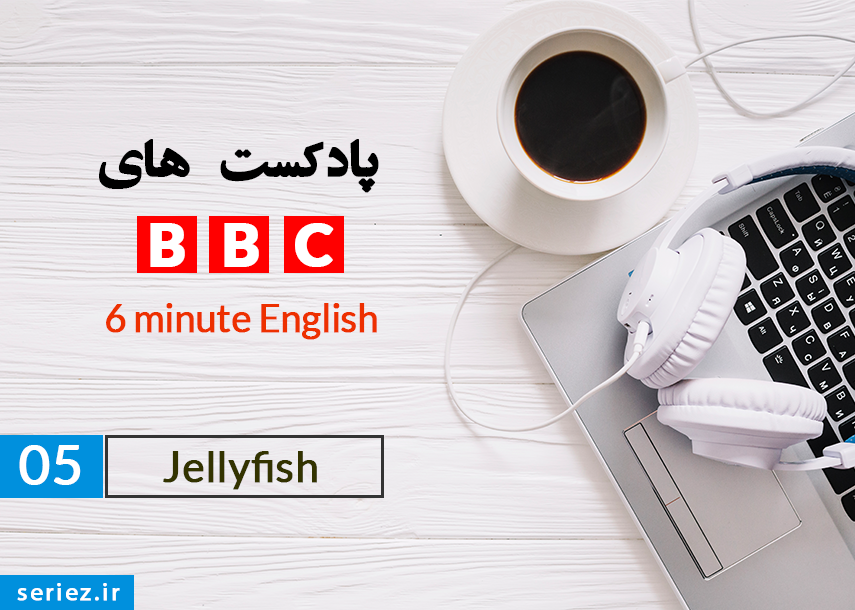پادکست های BBC 6 minute English – jellyfish

قسمت پنجم پادکست های BBC 6 Minute English
در بخش پنجم پادکست های ۶ دقیقه ای بی بی سی، 6 لغت مهم با محوریت موضوع Can jellyfish help us solve our problems? (آیا عروس دریایی میتواند مشکلاتمان را حل کند؟) بررسی می شود.
- ابتدا پادکست را بدون متن گوش کنید.
- آن را دوباره به همراه متن گوش دهید و
- در مرحله آخر لغات آن را مرور کنید.
پادکست شماره 5 (Jellyfish)
environmentally friendly دوستدار محيط زيست
Ex: There are a growing number of investors backing firms that are environmentally-friendly.
سرمایه گذاران روبه رشد زیادی وجود دارند که درحال حمایت از شرکت های دوستدار محیط زیست هستند.
single-use (plastics) (پلاستیک و …)یک بار مصرف
Ex: Single–use plastics are most commonly used for packaging and serviceware, such as bottles, wrappers, straws, and bags.
پلاستیک های یکبار مصرف اغلب برای بسته بندی و خدماتی مثل بطری ها، کاغذکادوها، نی ها و کیف ها استفاده می شوند.
unheard of باور نکردنی، بی سابقه، کس نشنیده
Ex: It was unheard-of for an unmarried couple to live together.”
باورنکردنی بود دو نفر که ازدواج نکردند باهم زندگی کنند.
mucus خلط، (ماده ی لعابی و لیز که از شامه ی مخاطی می تراود) لعاب، مخاط
Ex: she has a bad cold and her nose is filled with mucus
سرماخوردگی بدی دارد و اخلاط بینی او را گرفته است.
absorptive جاذب، جذب کننده
Ex: The compound is formed so that it can enable uptake by absorptive cells.
ترکیب به شکلیست که بتواند سلول های جاذب را بالا کشد.
magnet آهن ربا ، مغناطیس
Ex: The region has become a magnet for small businesses.
منطقه تبدیل به آهنربایی برای کسب و کارهای کوچک نبدیل شده است.
Neil
Hello. This is 6 Minute English from BBC Learning English. I’m Neil.
Georgina
And I’m Georgina.
Neil
Of all the weird and wonderful creatures living under the sea, perhaps the strangest are jellyfish – those rubbery, cone-shaped creatures found floating in the water, their long tentacles trailing behind.
Georgina
Some jellyfish species have a bad reputation for scaring away tourists, clogging up fishing nets, and even blocking power station pipes.
Neil
But with more and more plastic rubbish ending up in the sea, these days you’re as likely to swim into a plastic bag as a jellyfish. Now scientific research is discovering that these rubbery sea creatures might provide an answer – a sticky solution to the problem of plastic pollution.
Georgina
In this programme, we’ll be learning how jellyfish mucus could provide the answer to plastic waste in the seas. And of course we’ll be learning some related vocabulary along the way.
Neil
But first it’s time for my quiz question. Georgina, you mentioned jellyfish scaring away beach goers with their sting, but what is the best way to treat jellyfish stings? Is it:
a) with ice?,
b) with salt?, or,
c) with vinegar?
Georgina
Well, Neil, I have been stung by a jellyfish before and I think the best way to treat them is, c) with vinegar.
Neil
OK, Georgina, we’ll find out later if that’s right. Now, as I mentioned, in recent years tiny pieces of plastic called microplastic have been a significant problem for the world’s seas and oceans. They’ve been found all over the world – in Arctic ice, at the bottom of the sea and even inside animals, including humans.
Georgina
Slovenian scientist, Dr Ana Rotter, heads Go Jelly, a European research team of jellyfish ecologists looking into the problem. Here she is speaking to BBC World Service programme, People Fixing the World:
Dr Ana Rotter
Microplastics, plastics in general, are being an increasing problem – they’re everywhere. When I was a little girl we were more environmentally friendly, not knowing… so we never used plastic bags to go shopping, we always went with a cloth bags, we never used plastic to put our vegetable in it, single-use spoons, or forks, knives… this is for me something unheard of when I was a little girl.
Neil
Dr Rotter says when she was a child, people were more environmentally friendly – not harmful to the environment or having the least possible impact on it.
Georgina
At that time, there were very few single-use plastics – plastic items, like spoons and forks, designed to be used just once, then thrown away.
Neil
Single-use plastic bags, for example, were unheard of – surprising or shocking because they were not previously known about or commonly used.
Georgina
The situation since then has changed dramatically. In fact, there’s been such an increase in microplastics that today the UN lists plastic pollution as one of the world’s top environmental threats. But how do jellyfish fit into the story?
Neil
Well, it’s the ‘jelly’ part of jellyfish, and specifically their sticky, jelly-like mucus that is key. Here’s Dr Rotter again, explaining more to BBC World Service programme, People Fixing the World:
Dr Ana Rotter
The mucus – this is a like a viscous substance that is being excreted from a jellyfish, might have they are called absorptive properties… so it means that the particles – various particles can attach to this mucus… so, could we use jellyfish and their mucus as a magnet for the microplastic particles?
Georgina
Jellyfish produce a thick, sticky liquid called mucus. Dr Rotter has discovered that this mucus has strong absorptive properties – it can absorb, take in liquids and other substances and hold them in.
Neil
One of the substances jellyfish mucus absorbs are the particles that make up microplastics. By trapping these tiny pieces of floating plastic, the mucus acts like a magnet – an object that attracts certain materials, like metal, or in this case, microplastic waste.
Georgina
As rising sea temperatures and overfishing of their natural predators have boosted jellyfish numbers, this novel way of using their mucus couldn’t have come at a better time.
Neil
Dr Rotter’s research is still in the early stages, but it’s hoped that jellyfish mucus could hold the key to a future free of microplastic polluted oceans.
Georgina
Which is a big prize for the cost of few jellyfish stings. Speaking of which, Neil, what was the correct answer to your quiz question?
Neil
Right, I asked you the best way to treat jellyfish stings. What did you say, Georgina?
Georgina
I said it’s c) with vinegar
Neil
Which is… the right answer! Well done. Vinegar inactivates the sting’s venom, so remember to pack a bottle of vinegar the next time you head to the beach!
Georgina
In this programme, we’ve been hearing how scientists are using jellyfish mucus – a thick, sticky liquid produced in their bodies, to break down microplastics in the sea.
Neil
Our addiction to single-use plastics – plastic items which are used only once, then thrown away, and which often get washed out to sea, has created a situation which is definitely not environmentally friendly – that means having minimal impact on the environment.
Georgina
Until quite recently, the problems of micropollution and single-use plastic were unheard of – surprising or shocking because of not having been previously known about.
Neil
Scientists are hoping that the mucus’s absorptive qualities – it’s ability to absorb liquids and other substances and hold them, will allow it to trap particles of plastic floating in the sea, making jellyfish mucus a magnet for pollution – an object that attracts certain materials – usually metals but in this case, microplastic waste.
Georgina
That’s all for this programme, but to hear more about how these amazing sea creatures could help clean our oceans, why not check out People Fixing the World from the BBC World Service?
Neil
And to hear more interesting items on trending topics, why not join us again soon here at 6 Minute English? Bye for now!
Georgina
Bye!
حال می توانید به سوال های زیر پاسخ دهید:
- people used to be more environmentally friendly. To what extent do you agree or disagree?
- what is the best way to treat jellyfish stings?
جواب هاتون رو کامنت کنید…


دیدگاهتان را بنویسید